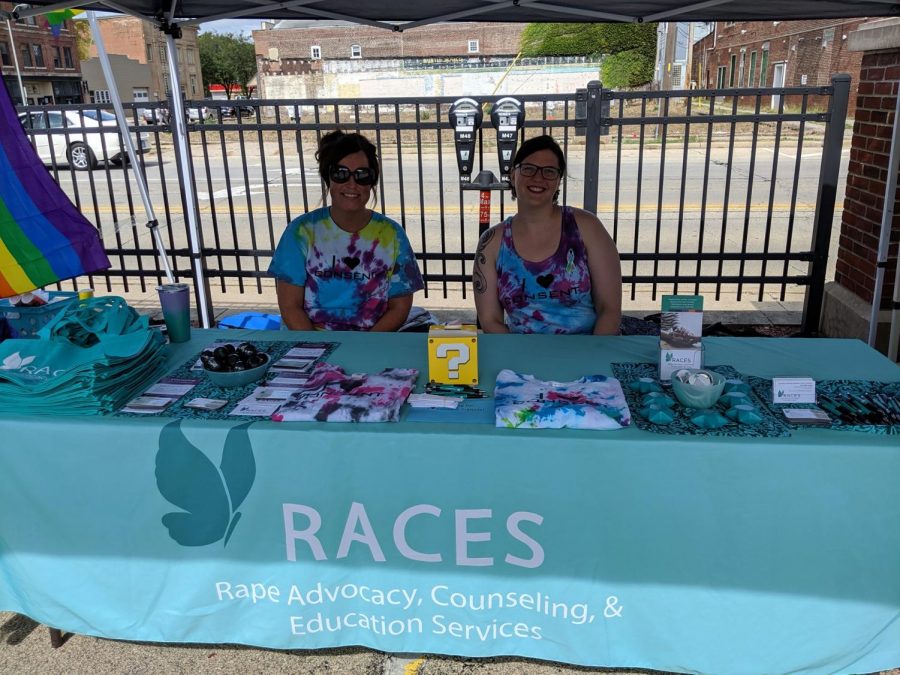RACES volunteers and callers affected by pandemic
Photo Courtesy of RACES’ Facebook
RACES representatives wait at a table at the C-U Pride Fest on Sept. 28, 2019. The organization has started receiving more calls since the COVID-19 pandemic began.
November 12, 2020
RACES, Rape Advocacy, Counseling, & Education Services, is an organization based out of the C-U area working to provide compassionate and comprehensive support to those affected by sexual trauma. They promote consent and support by providing prevention education programs, counseling, legal advocacy, a 24-hour crisis line and medical advocacy to those in need.
While COVID-19 continues to severely affect business, organizations and people from all walks of life, RACES was no stranger to the toll taken.
Roli Sharma, a junior in LAS and a volunteer at the RACES 24 hour crisis line, first started working in late February after completing her 40-hour course from DFCS and online training that all the volunteers are required to complete in January.
“The way the crisis line works is that someone dials in the number, which connects them to a third party organization where people take down the person’s information and hangs up,” she said. “After that, they call me and give me the caller’s information, and I call them back, while my number remains anonymous.”
The process helps streamline callers, helping with redirection of their resources and balancing their offered help through the hotline, while simultaneously filtering through any of the spam or prank callers and ensuring volunteer confidentiality.
Get The Daily Illini in your inbox!
While the general requirement for all volunteers is two shifts a month at a minimum, one of the shifts is required to be overnight, lasting about 14 hours, from 8 p.m. to 6 a.m. Sharma said the hotline has the most activity on weekends.
She said although she had received a considerable amount of calls before the pandemic hit, the amount of calls she gets during the weekend shifts she has picked up post-COVID-19 has been significantly higher.
“I know there’s been a huge monetary loss because of this pandemic, but something that is grossly overlooked as an impact of the pandemic is that people are trapped in their homes with their perpetrators now,” she said.
Whether that be an abusive husband, boyfriend, or even relative, the limitation on commute and mobility outside of their own residence has deprived an enormous amount of people of the resources that would usually be available to them, like friends, extended family, other support systems and even Courage Connection, a domestic violence shelter which is unable to help because of lack of funds.
“For some people, even if they aren’t in imminent danger, they are completely deprived of their normal support systems,” she said.
Sharma said procedure states that if a person’s life is in danger, they, as volunteers, are required to call the cops. If the person is suicidal, they have a 5 step process they have to go through followed by which they also call the cops.
More often than not, though, she said the calls that she would receive would be where the person on the other end is crying, generally anxious, having a mental breakdown. In these cases, they are instructed to simply be supportive, listen to them, validate their feelings and provide them with the resources that they offer.
“Sometimes, there’s, it’s just another person on the other end, reacting to something that had already happened and nowhere else to go to. All we can do is listen and be empathetic, which I think is the most important thing,” she said.
She also said that they were struggling too, due to the pandemic. While RACES did provide in-person counseling, everything had to be moved online, including counseling. And with many volunteers being students of the University, they faced a lot of struggles with moving everything online because volunteers, like Sharma herself, left the state or country or just wanted a break due to the pandemic once again.
Sharma said, in one interaction with her supervisor, she said she was swamped with her usual managerial work and always taking calls because there was a reduced number of volunteers so she had to step in.
“Talking to people through the hotline is quite taxing as it is,” she said. “Some calls can go on for hours, and we are required to be supportive through it all, which given everything that is happening right now, is hard for us too.”







